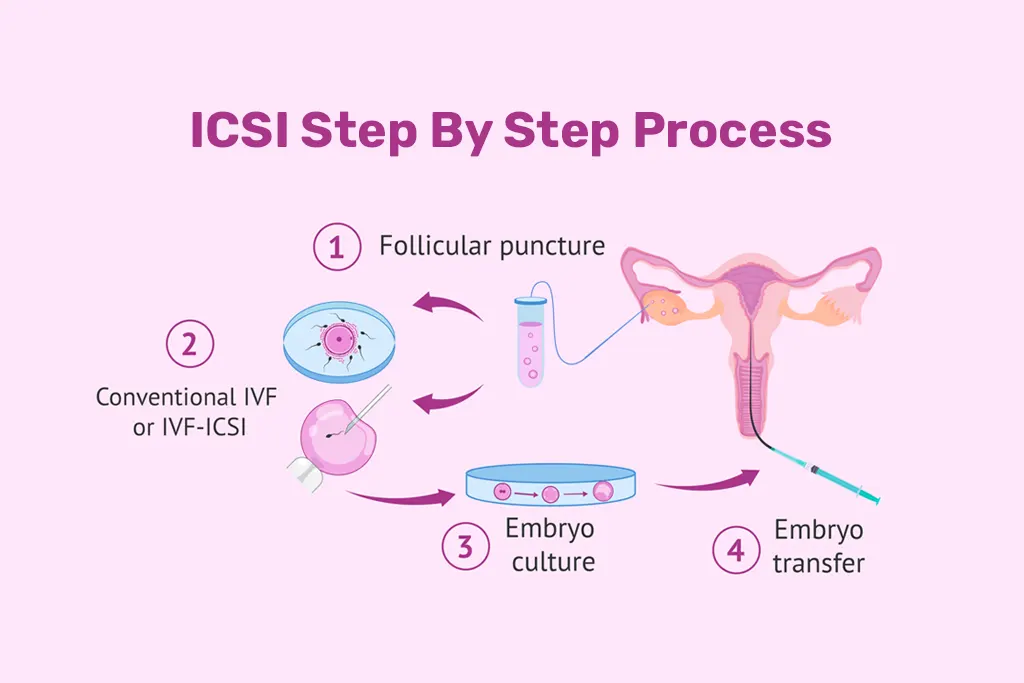ICSI (Intracytoplasmic Sperm Injection)
ICSI (Intracytoplasmic Sperm Injection) is an advanced form of IVF used to treat severe male infertility. In this procedure, a single healthy sperm is directly injected into the cytoplasm of a mature egg to facilitate fertilization. ICSI has revolutionized treatment for couples struggling with low sperm count, poor sperm motility, or unexplained infertility.

What to Expect During ICSI
1. Ovarian Stimulation
The woman receives hormonal injections for 8–12 days to produce multiple eggs, monitored through ultrasounds and blood tests.
2. Egg Retrieval
Mature eggs are collected via a minor surgical procedure under light sedation.
3. Sperm Collection & Selection
Sperm is collected from the male partner or donor. Even in cases of very low sperm count, ICSI allows selection of a single motile sperm.
4. Microinjection
A high-powered microscope is used to inject a single sperm into each egg. This bypasses any issues related to sperm penetration.
5. Embryo Development & Transfer
The fertilized eggs (embryos) are cultured for 3–5 days. One or more healthy embryos are then transferred to the uterus.

Benefits of ICSI
- Overcomes severe male infertility issues (low count, motility, morphology)
- Higher fertilization success rate compared to traditional IVF
- Helps when sperm retrieval is done surgically (e.g., TESA, PESA)
- Reduces chances of failed fertilization
- Can be used with frozen or donor sperm
Ideal Candidates for ICSI
- Men with very low sperm count or poor sperm quality
- Men with previous vasectomy or testicular failure (using surgical sperm retrieval)
- Couples with previously failed IVF cycles
- Unexplained infertility cases
- Use of frozen, surgically retrieved, or donor sperm
Pre- and Post-Procedure Care
Before ICSI: Both partners undergo testing — semen analysis, hormone tests, ultrasound, and infection screening. A healthy lifestyle is encouraged for optimal results.
After Embryo Transfer: Avoid stress, follow medication protocol, and rest as advised. A pregnancy blood test is typically done 10–14 days after embryo transfer.
Testimonials
"My husband's sperm count was nearly zero. ICSI made our dream of parenthood come true. We’re expecting twins!" – Megha & Rakesh S.
"After failed IVF cycles, ICSI was our breakthrough. The team explained every step with care." – Divya & Nikhil P.
Frequently Asked Questions
Is ICSI different from IVF?
ICSI is a specialized step within IVF where a single sperm is injected into an egg. IVF without ICSI allows sperm to fertilize the egg naturally in a dish.
Does ICSI guarantee success?
ICSI improves fertilization rates but pregnancy success also depends on embryo quality, uterine health, and age.
Are there risks to the baby?
Babies born via ICSI are as healthy as those from traditional IVF. However, your doctor will discuss any rare risks based on your case.
Can we choose ICSI directly?
ICSI is usually recommended for male factor infertility or failed IVF. Your fertility specialist will guide you based on test results.
Contact Dr. Rainee Agrawal
Considering ICSI? Get personalized fertility guidance with compassion and advanced care.
Contact Us
+91 9179559565
Contact Person: Dr. Rainee Agrawal